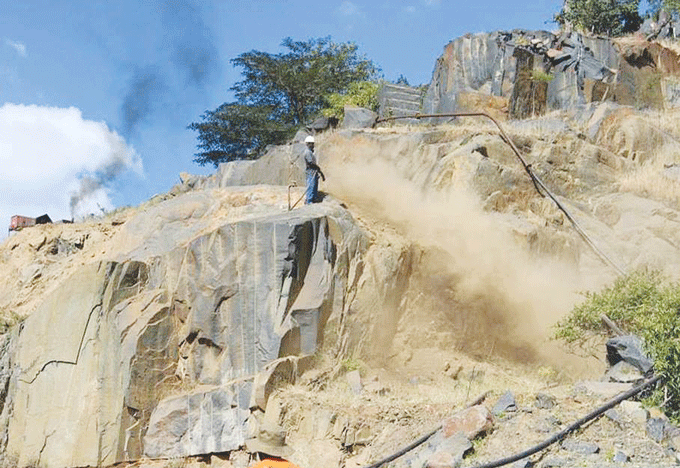
A CONVOY of trucks laden with huge black granite rocks trundles along the dusty pathway as a group of villagers look on grimly.
Everyday more than 60 trucks take granite for export along this rugged road through Nyamakope village in the district of Mutoko, 90 miles east of Zimbabwe’s capital, Harare.
The air reverberates with blasts and heavy machinery noises as the mountain above the village is slowly reduced, slab by slab. Quarrying has been happening here since the 1980s.
Mutoko stone is sought after for its lustre. It is a popular material for tombstones. An extension to the Danish royal library in Copenhagen, known as the Black Diamond, is clad in Mutoko granite.
The Buja people who live here say that as mining companies extract wealth from the mountain, they leave behind a trail of damaged roads and bridges, hazardous pollutants and dirty air. Cracks can be seen on houses and blast debris is everywhere.
Now 50 families in the village have been told by a Chinese mining company that they will have to leave their homes and land. People in four other villages in the district fear they will also lose their ancestral lands.
Two families, including an 82-year-old villager and his wife, have already been relocated by Jinding mining company, which wants to build a polishing plant.
“An 82-year-old man collapsed when he heard the news because he never anticipated it. He was later resuscitated at the hospital. This is how bad things are here,” says Claudine Mupereri, 38.
- Chamisa under fire over US$120K donation
- Mavhunga puts DeMbare into Chibuku quarterfinals
- Pension funds bet on Cabora Bassa oilfields
- Councils defy govt fire tender directive
Keep Reading
She says the man was told his house was within the area licensed to the mining company by the government. Zimbabwe’s Communal Areas Act gives the President power to decide the use of an area that makes up 40% of the country’s land, home to about 70% of the population.
“These companies do not respect communities. If the government does not protect us, then where will we get the protection we need?” Mupereri said.
Two other families were given US$2 500 (£1 840) to rebuild their homes, but community leaders say this is insufficient.
“There is uncertainty around this village. Right now, we do not have anyone willing to help us because our councillor does not want to help us. Anyone who dares to speak out is threatened. Whether they remove us or not, we are already scared to speak out,” says Anesu Nyamuzuwe.
The 40-year-old father of four fears losing the five hectares (12 acres) of land, his only source of income.
“I have a good farm with fertile soil. My farming always meets my household requirements. I had built a good home and I am close to Mutoko centre, so I am not sure if I will ever get such a piece of land again,” he says.
“What is more important, investors or the villagers? We should have the right to reject these people from entering our community.”
Jinding mining company in China could not be reached for comment.
A manager and interpreter at the company’s plant in Mutoko says families which live within the 500 hectares the company is licensed to mine will be relocated, but added: “The people who are giving out the claims (to mining companies) have a problem. Why are they giving them (companies) so much land? This land is almost 500 hectares, I am sure they already know that people live in this place.”
Zimbabwe has enjoyed a close relationship with China for decades. But the bond between the two countries solidified when Western States imposed economic sanctions on the late former President Robert Mugabe’s government. As credit and investments dried up, China stepped in.
In 2018, Zimbabwe-Chinese relations were elevated from “all-weather friends” to strategic partners, paving way for Chinese investors to pour money into the country, particularly in the extractive industries, where they have been accused of paying little attention to environmental damage by environmental and human rights activists.
Those living near granite mines say companies are failing to restore the land after extraction. Open pits are left uncovered, endangering children and wildlife.
Zimbabwe’s government has been accused of turning a blind eye onto complaints because, critics say, it doesn’t want to anger its biggest investor.
Mine workers spoke of poor working conditions. At another mine in Mutoko, workers give accounts of beatings and poor pay.
“Imagine going to work everyday for over 12 hours and getting $50 at the end of it all. When I get home I am tired. My home knows no peace,” one worker said.
“My friend was beaten with a steel rod and another 17-year-old boy had his arm broken after coming to work late. He was given $250 as compensation after villagers complained.”
In 2020, two workers were shot and wounded in Gweru, allegedly by a Chinese miner after a quarrel over salary.
Evelyn Kutyauripo, a paralegal with the Zimbabwe Environmental Law Association (Zela), who has been rallying villagers in Mutoko to resist evictions, said local officials needed to protect people.
“I blame the headmen and the councillors because they are working with the Chinese. They should stand with the community,” she said, adding that companies were taking from communities and not helping them develop.
“They are not developing anything in the community. They should have a strong corporate social responsibility because they are killing our environment.
“We are suffering, our houses are cracking and there is pollution. The government should come to see what is happening.”
Another Chinese mining company, Shanghau Haoying Mining Investments, is also causing unease among Nyamaropa villagers. — Guardian











